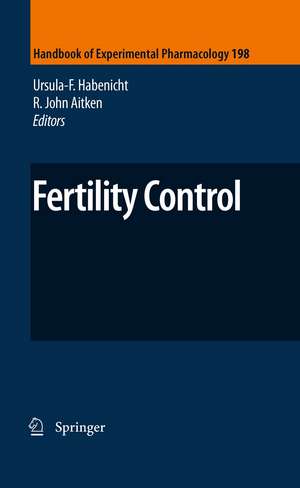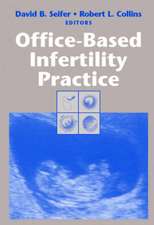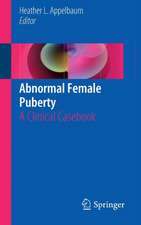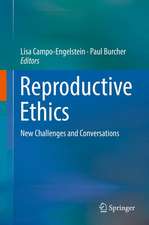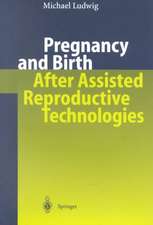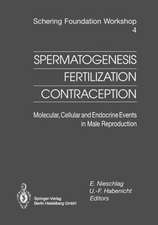Fertility Control: Handbook of Experimental Pharmacology, cartea 198
Editat de Ursula-F. Habenicht, Robert John Aitkenen Limba Engleză Paperback – 31 oct 2014
| Toate formatele și edițiile | Preț | Express |
|---|---|---|
| Paperback (1) | 2102.78 lei 6-8 săpt. | |
| Springer Berlin, Heidelberg – 31 oct 2014 | 2102.78 lei 6-8 săpt. | |
| Hardback (1) | 2107.91 lei 6-8 săpt. | |
| Springer Berlin, Heidelberg – 6 sep 2010 | 2107.91 lei 6-8 săpt. |
Din seria Handbook of Experimental Pharmacology
- 5%
 Preț: 3517.78 lei
Preț: 3517.78 lei - 5%
 Preț: 1425.97 lei
Preț: 1425.97 lei - 5%
 Preț: 1435.28 lei
Preț: 1435.28 lei - 5%
 Preț: 1430.52 lei
Preț: 1430.52 lei - 5%
 Preț: 1930.69 lei
Preț: 1930.69 lei - 5%
 Preț: 1922.47 lei
Preț: 1922.47 lei - 5%
 Preț: 1937.46 lei
Preț: 1937.46 lei - 5%
 Preț: 2117.58 lei
Preț: 2117.58 lei - 5%
 Preț: 2119.96 lei
Preț: 2119.96 lei - 5%
 Preț: 2117.38 lei
Preț: 2117.38 lei - 5%
 Preț: 1088.17 lei
Preț: 1088.17 lei - 5%
 Preț: 1098.27 lei
Preț: 1098.27 lei - 5%
 Preț: 1420.29 lei
Preț: 1420.29 lei - 5%
 Preț: 1104.84 lei
Preț: 1104.84 lei - 5%
 Preț: 1104.84 lei
Preț: 1104.84 lei - 5%
 Preț: 1108.14 lei
Preț: 1108.14 lei - 5%
 Preț: 1106.69 lei
Preț: 1106.69 lei - 5%
 Preț: 1105.77 lei
Preț: 1105.77 lei - 5%
 Preț: 1174.35 lei
Preț: 1174.35 lei - 5%
 Preț: 1432.50 lei
Preț: 1432.50 lei - 5%
 Preț: 408.48 lei
Preț: 408.48 lei - 5%
 Preț: 409.63 lei
Preț: 409.63 lei - 5%
 Preț: 539.90 lei
Preț: 539.90 lei - 5%
 Preț: 720.47 lei
Preț: 720.47 lei - 5%
 Preț: 733.09 lei
Preț: 733.09 lei - 5%
 Preț: 731.27 lei
Preț: 731.27 lei - 5%
 Preț: 746.43 lei
Preț: 746.43 lei - 5%
 Preț: 747.72 lei
Preț: 747.72 lei - 5%
 Preț: 725.24 lei
Preț: 725.24 lei - 5%
 Preț: 742.80 lei
Preț: 742.80 lei - 5%
 Preț: 393.23 lei
Preț: 393.23 lei - 5%
 Preț: 735.66 lei
Preț: 735.66 lei - 5%
 Preț: 728.33 lei
Preț: 728.33 lei - 5%
 Preț: 389.52 lei
Preț: 389.52 lei - 5%
 Preț: 730.71 lei
Preț: 730.71 lei - 5%
 Preț: 740.58 lei
Preț: 740.58 lei - 5%
 Preț: 730.19 lei
Preț: 730.19 lei - 5%
 Preț: 723.42 lei
Preț: 723.42 lei - 5%
 Preț: 731.27 lei
Preț: 731.27 lei - 5%
 Preț: 726.68 lei
Preț: 726.68 lei - 5%
 Preț: 3516.49 lei
Preț: 3516.49 lei - 5%
 Preț: 729.26 lei
Preț: 729.26 lei - 5%
 Preț: 737.11 lei
Preț: 737.11 lei - 5%
 Preț: 730.92 lei
Preț: 730.92 lei - 5%
 Preț: 738.78 lei
Preț: 738.78 lei - 5%
 Preț: 909.94 lei
Preț: 909.94 lei - 5%
 Preț: 720.10 lei
Preț: 720.10 lei - 5%
 Preț: 734.74 lei
Preț: 734.74 lei - 5%
 Preț: 727.80 lei
Preț: 727.80 lei
Preț: 2102.78 lei
Preț vechi: 2213.45 lei
-5% Nou
Puncte Express: 3154
Preț estimativ în valută:
402.42€ • 418.58$ • 332.22£
402.42€ • 418.58$ • 332.22£
Carte tipărită la comandă
Livrare economică 14-28 aprilie
Preluare comenzi: 021 569.72.76
Specificații
ISBN-13: 9783642422874
ISBN-10: 364242287X
Pagini: 280
Ilustrații: XIII, 263 p.
Dimensiuni: 155 x 235 x 17 mm
Greutate: 0.4 kg
Ediția:2010
Editura: Springer Berlin, Heidelberg
Colecția Springer
Seria Handbook of Experimental Pharmacology
Locul publicării:Berlin, Heidelberg, Germany
ISBN-10: 364242287X
Pagini: 280
Ilustrații: XIII, 263 p.
Dimensiuni: 155 x 235 x 17 mm
Greutate: 0.4 kg
Ediția:2010
Editura: Springer Berlin, Heidelberg
Colecția Springer
Seria Handbook of Experimental Pharmacology
Locul publicării:Berlin, Heidelberg, Germany
Public țintă
ResearchCuprins
Female Reproduction.- New Insights into Ovarian Function.- Estrogen Signaling in the Regulation of Female Reproductive Functions.- Progesterone Receptors and Ovulation.- Contraception Targets in Mammalian Ovarian Development.- Proteomics of Embryonic Implantation.- Evaluation of Plasma Membrane Calcium/Calmodulin-Dependent ATPase Isoform 4 as a Potential Target for Fertility Control.- Male Reproduction.- New Insights into Sperm Physiology and Pathology.- The Epididymis as a Target for Male Contraceptive Development.- Sperm–Zona Pellucida Interaction: Molecular Mechanisms and the Potential for Contraceptive Intervention.- Mouse Models as Tools in Fertility Research and Male-Based Contraceptive Development.- New options: From target to product.- Male Hormonal Contraception.- Family Planning: Today and in the Future.
Caracteristici
Our knowledge of reproductive mechanisms has increased dramatically in the recent past and this is an ideal moment to consider the implications of this new knowledge from a contraceptive perspective This book represents a unique collection of papers from internationally renowned experts Gives a state-of-the art summary of current concepts in reproductive biology Includes supplementary material: sn.pub/extras
Descriere
Descriere de la o altă ediție sau format:
This book represents a unique collection of papers from internationally renowned experts to give us a state-of-the art summary of current concepts in reproductive biology. The narrative has been developed to highlight how new gains in our understanding of reproductive mechanisms have generated unique opportunities for contraceptive development.
